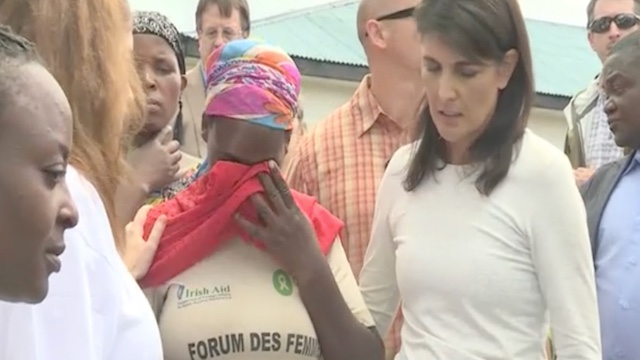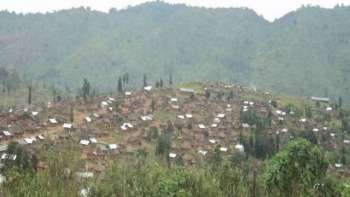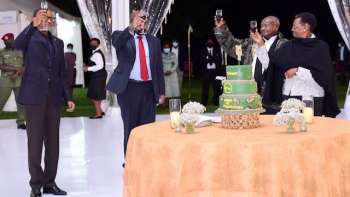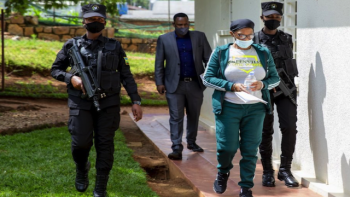On March 28, 2017, the U.S. Ambassador to the United Nations, Nikki Haley, said that the U.N. peacekeepers in the Democratic Republic of Congo (DRC), serving within MONUSCO, are aiding a DRC government that is "corrupt and preys on its citizens". Six months later, Ambassador Nikki Haley traveled to the same DRC to see for herself how the corrupt, inept, and predatory government led by Joseph Kabila, like many dictatorships in Africa, has extended its hold onto the traumatized people and ignored the constitution and nation institutions.
"The U.N. peacekeeping mission is mandated to partner with the government," Ambassador Nikki Haley had continued, while addressing the Council on Foreign Relations in New York, "In other words, the U.N. is aiding a government that is inflicting predatory behavior against its own people. We should have the decency and common sense to end this." .
Ambassador Nikki Haley Moved to Tears by the Plight of Congolese People
On October 26, 2017, during a visit to Mungote camp, Kitchanga region, North-Kivu Province, Eastern DRC, Ambassador Nikki Haley was moved to tears as she heard horrifying stories of Congolese people displaced by violence. She was on her last leg, concluding a tour that took her to Ethiopia, South Sudan, and DRC.
In Mungote camp, Ambassador Haley heard stories of sexually abused women, young women forced into early marriage and giving birth in the camps in unsanitary conditions. Ambassador Haley met children born out of these tragedies and whose lives are as hopeless as those of their struggling mothers and, most of the time killed or absent fathers.
These horrifying stories are an iceberg in a sea of terror that has been unleashed on the region for the last 23 years.
Over these years, warlords, Rwandan Defense Forces, Congolese militias, Ugandan Defense Forces, and other armed groups have, with various reasons or motives, been active and wreaking havoc in Eastern DRC. Current Rwandan government's defense forces have played the most destructive and horrifying role.
Independent organizations and international organizations, including the UN have accused Rwandan government defence forces of being responsible of widespread and systematic massacres of Congolese civilians and Rwandan refugiees; acts that may qualify as "genocide", by in the United Nations 2010 Mapping Report (see here) . Non government organizations, including several independent international organizations have estimated that the current Rwandan government defense forces have systematically masscred between 5 and 7 million Congolese civilians and Rwandan refugees in Eastern DRC, since 2003.
A Shift in US Policy Under President Trump?
The visit of Ambassador Nikki Haley appears to highlight the shift in the United States' African policy under President Trump's administration. The fact that Ambassador Nikki Haley has avoided countries such as Rwanda and Uganda, that were at the center of the US policy launched by the Clinton's Administration in the 1990's appears to signal a new beginning.
"No one should live like this. We can't turn a blind eye to all of this." Ambassador Haley, close to tears, told reporters.
On Friday, October 27, 2017, Ambassador Nikki Haley met with Congolese President Joseph Kabila. Joseph Kabila's second and last term allowed by the DRC Constitution ended in December 2016. He has refused to step down from power despite multiple calls, negotiations, mediations, and popular protests. Joseph Kabila ascended to power after his father was assassinated by in 2001, by suspected Rwandan military intelligence operatives. He has been considering changing the constitution to remain in power, like other dictators in the region have done, including Yoweri Museveni of Uganda, Paul Kagame of Rwanda, Dennis Sassou Nguesso of the Republic of Congo, Paul Biya of Cameroon, and Teodoro Obiang Nguema Mbasogo of Equatorial Guinea.
During the visit in Sudan, a violent demonstration by displaced cvilians against President Salva Kiir erupted. Since its independence from Sudan, after years of struggle against Khartoum power, South Sudan has been unable to move beyond tribal conflicts, corruption and repression despite years of US Government support and billion of dollars in US aid. Ambassador Haley made it clear that the U.S. is looking forward to an after-Kiir period:
“We are disappointed by what we are seeing. This is not what we thought we were investing in. What we thought we were investing in was a free, fair society where people could be safe and South Sudan is the opposite of that, " she said in statement released by the UN.
After the visit in Eastern DRC , Nikki Haley promised to do something and give a message to Joseph Kabila similar to the one she gave to Silva Kiir. "We to find a way to have a peaceful situation, we have to find a way for them to have safe and fair elections, so we that we can get some leaders that know how to handle this situation and get these armed groups to stop, " she told reporters.
Warning to African Dictators and Positive Engagement by the US Government
She followed suit when she met Joseph Kabila. After their closed door meeting, Ambassador Haley said that she urged Joseph Kabila to state clearly his firm resolution of stepping down as planned and to publish the elections calendar. She also said that she will brief and propose actionable solutions to both President Trump and the US Congress on her emotional trip to Ethiopia, South Sudan, and the DRC.
The open question is now about President Trump's next actions, if Joseph Kabila and Salva Kiir do not follow Nikki Haley's advice. Already, Joseph Kabila's Minister of Communications, Lambert Mende, stated that DRC government has no lessons to receive from Ambassador Nikki Haley and the US Government, telling Reuters that “It’s not up to the government, nor to Ms. Haley, to organize the elections. I don’t think that we can be subjected to these kinds of diktats.”
An extension would also be what the US Government will do to other African dictators of the region. As Ambassador Nikki Haley made it clear in her interviews reflecting on her trip, the African dictators "can tell us all the words [they] wanted to say but [] words don't match [] actions."
In fact behind the warning the warning to African dictators,the US Government is considering more productive engagements.
“The United States very much sees Africa as a very important part of the world. We see great opportunities in Africa, we see challenges in Africa, but we want to support and help in those situations. But most importantly we want to see how we can partner together, whether that is through economic development, whether it is through strategic practices, whether it’s through political solutions,” Ambassador Nikki Haley said.
















